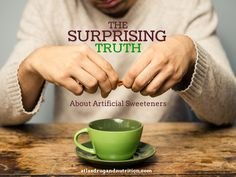Many folks have a love/hate relationship with sugar. They may a love of sweets, but hate the pounds it packs on. A diet rich in sugar can cause more than just undesirable weight gain. It can also lead to health problems such as diabetes, anxiety, depression, and heart disease. So what’s a sugar lover to do? Are artificial sweeteners the answer?
Tetanus, Anyone?
Tetanus, anyone? How about a little mercury or aluminum to complement your meal? Maybe you’d like some scorpion venom to sweeten your drink? No? All of these have one thing in common with artificial sweeteners – they are all neurotoxins.
Neurotoxins are dangerous. These toxins can cause symptoms immediately, or take several years to manifest. For example: venom from poisonous animals can cause organ failure within minutes, while lead (also a neurotoxin), may build up in the body for years before mental, emotional, and physical symptoms show up.
Artificial Sweeteners – The Truth
Artificial sweeteners such as sucralose and aspartame are slow-acting neurotoxins. In his book Excitotoxins: The Taste That Kills, Dr. Russell Blaylock writes that aspartame is a “poison that affects protein synthesis; affects how the synapses operate in the brain, and affects DNA, it can affect numerous organs. So you can get many different symptoms that seem unconnected.” He states “most of them are neurological”. Some of these include:
● headaches
● changes in mood
● difficulty concentrating
● depression
● seizures
● body aches and pains
Artificial sweeteners are added to everything from diet sodas, popcorn, yogurt, breakfast cereal, and even orange juice. How can we eliminate our exposure to neurotoxins while satisfying our sweet tooth?
Natural Sweeteners You Can Live With
What if you can’t live without your morning cup of coffee spiked with one of those colored packets? Maybe you love to bake, but don’t want to add unnecessary calories to your recipe. You have good intentions, so kudos to you! Are all sweeteners bad? Of course not! Here are a few tips on help you use artificial sweeteners safely.
● Stevia
Stevia is a natural herb that is sweeter than table sugar. The good news is that it’s also zero-calorie. Use stevia in your coffee, tea, and even baked goods.
● Maple Syrup
Maple syrup can be used as a safe alternative to sugar. Try maple syrup in plain yogurt, drizzled over sweet potatoes, in smoothies, and some cookies and breads.
● Honey
Honey is an alternative to sugar that offers health benefits. Honey can help heal the gut, reduce inflammation, and improve allergy symptoms. Use honey in your favorite tea or compatible recipes.
● Coconut Nectar
Coconut nectar is a low-glycemic sweetener that works well in baked goods.
It’s official: with so many options for natural sweeteners you’ll never have to rip open a little pink packet again!
Could you use a few more suggestions to kick the sugar habit, get more energy, and maintain a healthy weight? A cleanse may be just what you need. As a certified clinical nutritionist I’ve set out to answer the most common questions I hear from people about cleansing, helping you decide if a cleanse is right for you. Download it here: http://bit.ly/VNNDK6
______________________________________________________________________________
Tony Ortiz is a Certified Clinical Nutritionist, Pharmacist and owner of Atlas Drug and Nutrition at 8416 Kennedy Boulevard in North Bergen, New Jersey.
As an anti-aging specialist, Tony often helps people dealing with complex or “vague” illnesses when traditional providers are at a loss. His website http://atlasdrugandnutrition.com, also provides practical help for people struggling with weight gain, hormone imbalance, diabetes, or high cholesterol. Request a free consultation today. Have a question you’d like to see addressed here? Tell Tony via the contact page on our site.
